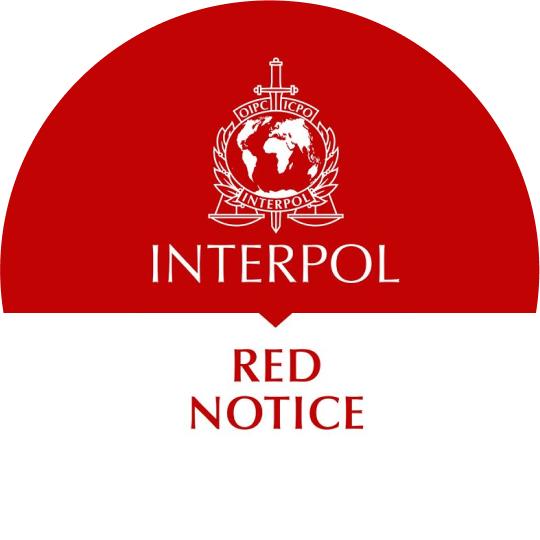
Red Notice Removal
The process of red notice removal is a crucial and often complex procedure that involves significant attention to detail and working with various international legal frameworks. These red notices, issued by the International Criminal Police Organization (INTERPOL), can hinder individuals and businesses in countless ways, including the denial of travel freedoms, seizure of assets, and damaging reputations. Seeking experienced legal counsel becomes essential in ensuring the accurate navigation and understanding of the intricacies associated with the red notice removal process.

Our Legal team has the experience and expertise in addressing rights violations arising from these notices. They work diligently to protect clients’ rights across borders, aiming to remove red notices. These efforts can restore affected individuals’ lives, reputations, and futures during challenging times.
- Interpol Red Notice removal – deleting an Interpol Red Notice
- Notice publication and removal
- Interpol Red Notice
- Interpol Diffusion
- Consequences of Interpol Diffusion or Red Notice
- Case study of recent successful Red Notice Removals
- Request for Information: Interpol Red Notices
- Interpol Red Notice Removal
- Amending False Positives and Incomplete Interpol Red Notice Deletion
- How to remove an INTERPOL Red Notice
- Specialists in Interpol cases
- Interpol Red Notice removal FAQ
Interpol Red Notice removal – deleting an Interpol Red Notice
Our Cyprus-based business is well-versed in Interpol’s rules as well as proceedings before the Commission for Control of Files.
As a result, our litigators have a wide range of legal expertise, allowing them to craft robust and detailed petitions in response to abusive red notices issued by Interpol member states.
We specialize in Red Notices issued by Middle Eastern governments in financial disputes and politically driven situations. We may represent human rights advocates and political asylum seekers targeted by unfair Red Notices from their home countries.
If legal counsel is needed in the requesting country, we advise and oversee local attorneys to gather essential information from local courts to support Red Notice removal. When clients anticipate being targeted by an unfair Red Notice, we can take early action to persuade Interpol not to issue it.
We help our clients in three of Interpol’s four official languages: English, French, and Spanish. The firm is also used to handling emergency circumstances for clients who have recently been arrested or are facing extradition. All of our lawyers speak English fluently, and some also speak Spanish, Russian, and Greek.
Notice publication and removal
Interpol’s General Secretariat issues notices proactively or upon requests from NCBs or authorized international bodies. These alerts are posted on Interpol’s secure website, and if agreed upon by the requesting nation, extracts may be published on Interpol’s public site.
Interpol’s General Secretariat publishes notices that meet all legal requirements. Notices violating Interpol’s constitution, which prohibits involvement in political, military, religious, or racial activities, will not be published. The General Secretariat can also reject notifications it deems unsuitable or dangerous.
Interpol Red Notice
The most widely recognized device is the red notice, which serves as an international arrest order. It is issued to locate and apprehend a wanted individual for extradition. A red notice informs law enforcement in one nation that another country is seeking a specific person.
The notice includes two types of information: identity details (such as physical description, photo, fingerprints, and ID numbers) and legal information (the criminal offense, relevant laws, arrest warrant or court sentence references, etc.).
Interpol Diffusion
A diffusion, like a notice, is issued for the same objectives as a notice but is delivered directly by a member nation to a country of their choice. A diffusion is similar to a red notice, an international warning that informs the relevant law enforcement agencies in one country that authorities in another country are looking for a certain person. A diffusion, other than a red alert, is not publicized by Interpol at the request of the nation. Diffusions and red notices can both have similar impacts.

Consequences of Interpol Diffusion or Red Notice
Having an outstanding red notice or diffusion significantly increases the risk of arrest, both domestically and while traveling. Many countries require border and police officers to arrest individuals with red notices. It can also lead to the closure of bank accounts and negatively impact your job, professional standing, and personal reputation.
Case study of recent successful Red Notice Removals
Since 2017, Interpol-Stop has assisted numerous individuals who have been unfairly targeted by abusive red notices, which are frequently issued in the requesting country for political or commercial motives, in obtaining the deletion of their data from the Interpol database.
We also assisted several travelers who had cause to assume they were the target of a red notice in determining if Interpol had issued an arrest order against them.
Request for Information: Interpol Red Notices
Interpol member countries can submit a Red Notice request to find and provisionally arrest a person pending extradition into national police databases. The offense must be a serious ordinary-law crime.
The member country requests the Interpol Red Notice from the General Secretariat. It is issued by Interpol upon a member country’s request based on a valid national arrest warrant. However, the Interpol’s red notice doesn’t act as an international arrest warrant since the decision to arrest and extradite lies with the judicial authorities the member country.
Interpol is an independent body that enhances international cooperation between law enforcement officers in its member countries, but their role is limited to the analysis of whether requests can lead to potential misuse. As such, these Interpols alerts pose a significant threat to your freedom when you are a wanted person. However, not all Interpol Red Notices are publicly available, making it challenging to know if you have one. Some of these notices are only available through restricted networks only accessible by national law enforcement authorities.
Unawareness of being on this list can result in airport arrests while travelling. If you suspect you might have an Interpol notice, seek professional legal advice from our extradition attorneys, who will request Interpol information on your behalf.
Requests for information must be in English, French, Arabic, or Spanish. Upon our request, the Commission for the Control of Files (CCF) will check the Interpol Information System for any matches (IIS). The CCF will then decide whether to amend or remove your entry, and if so, notify the General Secretariat (IPSG).
Success depends on ensuring the information request meets the standards. Our extradition attorneys have an outstanding track record submitting such information requests and developing a strong legal defense strategy.
Interpol Red Notice Removal
Interpol Red Alerts should not be based on political, ethnic, or religious factors. If you suspect a Red Notice was issued for such reasons, you should contest it. States misusing Red Notices for political purposes need to be challenged.
Interpol, as a democratic organization, must adhere to its Constitution and Data Processing Guidelines when issuing Red Alerts. These documents require clear criminal claims and allow for disputes in case of discrepancies.
Applicants for Red Notices must provide specific information, including individual identifiers and judicial details such as the case description, charges, relevant laws, penalties, and a valid arrest warrant or court decision.
Interpol must establish that the alleged offense justifies a Red Notice before making a decision.
We can assist in removing Red Notices that violate Interpol’s regulations. Our attorneys will examine the data provided by the accusing party and check for inconsistencies or lack of essential information to petition for a removal of an Interpol Red Notice.

Amending False Positives and Incomplete Interpol Red Notice Deletion
National Interpol Red Notice removals often fail. Interpol may agree to erase the Red Notice order, but the national state may not. This can result in airport arrest or refusal of entrance.
The Collegium of International Lawyers will analyze your situation and present possibilities. Our expert legal team will help you find national and international legal solutions using GDPR-based laws. We can request national police file data removal under the GDPR.
Efficiently removing this material from national police records is frequently as vital as Interpol deleting the Red Notice.
Interpol Red Notices last five years unless rescinded by Interpol or the sending nation. Red Notices can also be extended, therefore anyone with Red Notices should not think they are gone after five years.
Let our extradition attorneys check if the Interpol Red Notice against you has been removed.

How to remove an INTERPOL Red Notice
One blog article cannot cover all the techniques to fight INTERPOL Red Notices. The RPD and Constitution control INTERPOL. Successful challenges need a deep grasp of the RPD and Constitution and each factual scenario. So, effective challenges need a detailed comprehension of the RPD and Constitution applied to the unique factual circumstance. Expert legal guidance is always advised. Four common methods:
The first option for challenging the legality of a Red Notice
The first method for disputing a Red alert is to question its legitimacy. That means your legal counsel will need to show the notice violates Interpol’s rules. The offense must be “a significant ordinary-law offense,” according to Article 83(1) of the RPD. As a result, Red Notices should not be issued for offenses such as:
- behavioural or cultural norms;
- offenses connected to family or private problems;
- offenses stemming from the breach of laws stemming from private disputes;
- or offenses stemming from administrative or private conflicts.
In addition, if a Red Notice is issued for the prosecution of a serious crime, the RPD says that “the action constituting… (the)…offense is punished by a minimum of two years’ imprisonment…”
If a Red Notice is issued for an overdue sentence, the RPD stipulates that the penalty must be “at least six months in jail.”
Notably, the General Secretariat retains the ability under this section of the RPD to publish a Red Notice even if the aforementioned requirements are not satisfied. Thus, this issue may be the weakest avenue of recourse, while it remains a prospective route.
The second route to challenge the validity of a Red Notice
Another approach to contesting a Red Notice is under Article 83(2)(b) of the RPD. This article requires that Red Notices can only be published when sufficient judicial data is provided. This data includes a clear description of the criminal activities, the relevant laws, the maximum penalty, and a reference to a valid arrest warrant or judicial decision.
Given the high volume of Red Notice requests received by INTERPOL, it’s often worth ensuring that INTERPOL has conducted thorough investigations at these levels. Providing explanations to INTERPOL as to why these requirements may not have been met is a viable option. If it can be proven that the thresholds are not met, there are strong grounds for removing the Red Notice.
The third method for contesting the legitimacy of a Red Notice
The third option to contest the legitimacy of a Red Notice is under Article 2(1) of the Constitution, which asks if the notice is in accordance with the Universal Declaration of Human Rights (UDHR). If it can be claimed that mutual assistance with the member state’s request can lead to human rights violations, then the request may be denied. This might include demonstrating that the requesting state would not provide a fair trial in line with Articles 6 and 10 of the UDHR.
The fourth route to challenge the validity of a Red Notice
Article 3 of the Constitution is the fourth avenue for challenging the legality of a Red Notice. Article 3 specifies that INTERPOL “must not engage in any intervention or activity of a political, military, religious, or racial nature.” Although this is not exactly distinct from Article 2 of the Universal Declaration of Human Rights, this avenue allows for a more specific challenge via a major component of the INTERPOL constitution.
Specialists in Interpol cases
Our Interpol law firm has a specialized understanding of Interpol notices removal. Our Interpol lawyers handle intricate situations including red notices, diffusions, yellow notifications, green notices, and blue notices.
We collaborate with our international legal network as necessary. Our attorneys may give aid in criminal law and extradition law concerns on a global scale.
Additional specifics? Contact our Senior Partners Anatoly Yarovyi or Dmytro Konovalenko (cell phone / WhatsApp, Viber, Line, WeChat, Signal number: +357 96 447475; email: [email protected]).

Interpol Red Notice removal FAQ
- The offense in question is a significant ordinary-law felony.
- The offense in question is punished by a potential sentence of at least two years in prison or more.
- offenses that raise controversial issues relating to behavioral or cultural norms in various countries;
- offenses relating to family/private matters;
- offenses originating from a violation of administrative laws or regulations or arising from private disputes (such as unfunded/bad cheques).





